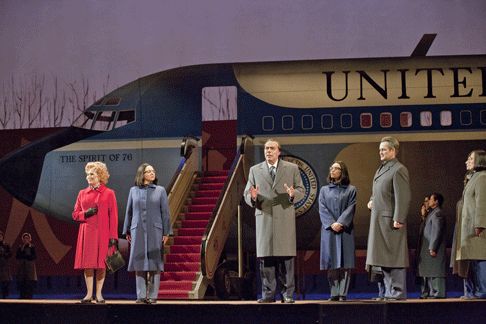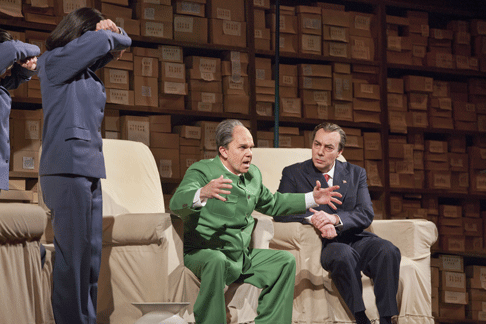07 Feb 2011
Nixon in China, New York
Preparing for the Met premier of Nixon in China, I resolved to forget—or place on hold—everything I remembered, or thought I remembered, about the real persons who are characters in this opera,

Preparing for the Met premier of Nixon in China, I resolved to forget—or place on hold—everything I remembered, or thought I remembered, about the real persons who are characters in this opera,
to convince myself I knew no more about them than I do about, say, the Doges of Genoa or the Kings of Sweden (to recall other operas that mingle the political with the personal), and to attempt to appreciate the drama presented on stage, the music emanating from it (far too much of it coming through microphones), on that disinterested level.
This made for an intriguing but confusing evening: I suspect composer John Adams and his librettist, Alice Goodman, actually do want you to dwell on your recollections of Nixon, Mao, et al., to allow these to color their operatic take on events. Nixon is a meditation on the events of its era through the medium of opera, which is a new sort of focus to put on the form.
Nixon in China is not my kind of opera, but let us examine what kind of opera it is, and why the audience at the Met’s premiere—and at its earlier performances, in Houston, Brooklyn and around the world—have received it with enthusiasm.
There were, first of all, the performances, and for so many performances to delight an audience for three and a half hours argues that the composer has created parts that can be inventively sung, that give scope to the artist and joy to the listener. (This was not the case in the same composer’s Dr. Atomic, with its unconvincing dramatic trajectory and sidelong meditations.) True, all the singers were mic’d, at the composer’s insistence, as in all his operas, but some of them sounded mic’d and others—especially the women—did not.
Kathleen Kim as Madame Mao stole the show with her coloratura flights in the bravura number that concludes Act II, and was amusing in her down-and-dirty duet with the Chairman. Robert Brubaker, as Mao, sang rather too forcefully for a man tottering on the brink of the grave, brusquely demolishing every attempt at flattery offered him by the unconvincing Americans. (In an amusing touch, his statements are “translated” by three secretaries, producing just about the only vocal harmonies of the evening.) Janis Kelly as Pat Nixon was affectingly hopeful, singing almost conversationally, enduring the tedium of a First Lady’s tour and an unemotional marriage in an appealing, almost tragic performance. Richard Paul Fink made a deliciously sinister pixie of Henry Kissinger and also sang the brutal landlord figure in a Chinese Revolutionary opera. Russell Braun sang a fading, dignified, melancholy Chou En-lai. Only James Maddalena, who has sung the title role in most performances of the opera since its premiere in 1987, sounded, on his Met debut, either long past major roles or under a severe unannounced cold. All these except Mr. Maddalena held our attention, sinking their teeth into roles the composer had filled with juicy meat. There is not much in this opera of confrontation, of music that erupts from vocal interaction; it is, rather, a series of static narratives, drama almost in the Handelian manner, singing heads for talking heads, if you will.
For me, though, the vocal stars of the performance were the Met chorus, which has been extraordinary in everything for the last couple of years. Their pronunciation of words was especially crisp and clear, their enthusiasm of mood infectious when, say, abruptly transformed from Party guests to pig farmers. I think I’d enjoy the Met chorus if they were singing the phonebook. The Chinese phonebook.
 Janis Kelly as Pat Nixon, Teresa S. Herold as the Second Secretary to Mao, James Maddalena as Richard Nixon, Ginger Costa Jackson as the First Secretary to Mao, Russell Braun as Chou En-lai
Janis Kelly as Pat Nixon, Teresa S. Herold as the Second Secretary to Mao, James Maddalena as Richard Nixon, Ginger Costa Jackson as the First Secretary to Mao, Russell Braun as Chou En-lai
The Peter Sellars production is very faithful to those shots I dimly remember of the original telecast of an earlier Sellars production. Those who saw Nixon in Brooklyn twenty years ago do not recall that Pat and Dick became so involved in the “Wicked Landlord Whips Peasant Girl” ballet in the Peking Opera scene, to the point of interfering with the characters onstage, but by that point in the story the naturalism of the first half of the opera was beginning to evaporate, borne on the wings of Adams’s repetitive, hypnotic accompaniments to unheard melodies. His mastery of suggestion became especially witty in the last act, the presentation of a row of beds occupied by all the characters as they suffer, chat, hallucinate, meditate, have sex or die: Pat recollects the dance music of forties films (two dancers oblige by reproducing such steps—Mark Morris created the witty choreography) and the orchestra plays no such tune but, rather, the tingling accompaniment that might lie beneath it, suggesting a step or a mood of elegance such as might linger in Pat’s mind from those forgotten, forgettable films and their hallucinations of romance. This in turn leads to a highly erotic reverie for the dying Mao and Chiang Ch’ing, whose marriage, however bloody it has become (and if we did not know all the hideous details twenty-five years ago, we certainly know them now), was once based upon a lustful and illicit affair, recalled joyously here.
The curious thing is that the audience for three or four hours of classical entertainment has come to delight in this sort of tableau, this elevation of the humans we have actually known to an archetypal status, and that opera is today considered the proper accolade to the achievement of a certain sort of celebrity, political or otherwise. This makes one wonder what opera, what singing rather than living, now implies to us. In the eighteenth century, operas seldom dealt with historical figures, and those that did dealt with ancient ones—Caesar, Cleopatra, Alfred the Great—in whom the monarchs of the day could see their own powers idealized, virtue rewarded, villainy dissipated. In the nineteenth century, when the bourgeois came to power, historical figures were shown in a lurid light, tainted by their power—and if they were not quite so antique, still, they were seldom closer in time than the previous century.
 Robert Brubaker as Mao Tse-tung and James Maddalena as Richard Nixon
Robert Brubaker as Mao Tse-tung and James Maddalena as Richard Nixon
Since World War II, especially in the United States, the operatic gift that has never quite seemed rooted in our soil has flowered into operatic treatments of Susan B. Anthony, Lizzie Borden, Carrie Nation, Malcolm X, Harvey Milk and J. Robert Oppenheimer—with Anna Nicole Smith soon to come. Whatever Ms. Smith’s charms, her celebrity seems of the most tendentious sort. Does anything about it call for gorgeous celebration? Is the whole idea not a spoof of opera to begin with? Do any of these pieces have the potential for a theatrical life removed from our memories of headlines? Yes: Susan B. Anthony had the luck to have an opera of genius written about her, The Mother of Us All. But the other works did not deal in archetypes; they are the musical equivalent of reportage, their substance gone once half the audience no longer knows what Nixon actually did. Modern celebrity opera is a sort of oral history if you like.
Returning to Nixon in China, one should mention that the piece was conducted by the composer, making his house debut, and that on several occasions it seemed to me that brasses and saxophones intruded a bit off-kilter and that certain rhythms were ragged—but I do not know the score well enough to be sure these moments were not intentional. There were moments of magic, especially in the “Peking Opera” ballet, and the final act was very beautiful, an extended concerted passage that never quite concerted: Nearly all the singers continued to sing alone, perhaps stressing their isolation in the drama, in the world. Or perhaps that was not the intent.
John Yohalem